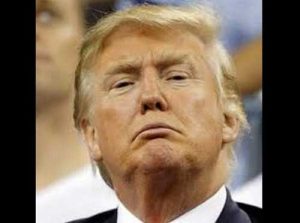 After Russia’s ambassador to Lebanon said Russian forces would shoot down any missiles fired at Syria, U.S. President Donald Trump said Wednesday Russia should be ready, “because they will be coming.”
After Russia’s ambassador to Lebanon said Russian forces would shoot down any missiles fired at Syria, U.S. President Donald Trump said Wednesday Russia should be ready, “because they will be coming.”
“You shouldn’t be partners with a Gas Killing Animal who kills his people and enjoys it!” Trump said on Twitter.
Russia responded by saying U.S. missiles should target “terrorists,” not the “legitimate government” in Syria.
Kremlin spokesman Dmitry Peskov also said Wednesday all parties involved in Syria should refrain from actions that could destabilize the region.
Syria referred to U.S. threats of missile strikes as “reckless escalation,” the state news agency said.
The situation in Syria has grown more tense since a suspected chemical attack Saturday in eastern Ghouta that killed at least 40 people.
The United States and several of its allies have focused on Syrian forces as being responsible, while Syria and Russia have denied President Bashar al-Assad’s military carried out a chemical attack.
Russia’s ambassador to Lebanon, Alexander Zasypkin, on Hezbollah’s al-Manar TV on Tuesday evening, warned that a U.S. strike on Syria would prompt a major escalation of the war in that country.[xyz-ihs snippet=”adsense-body-ad”]Trump earlier warned those responsible will pay a “big price,” and he has spoken repeatedly with his British and French counterparts about a possible response to the attack.
“We are looking for a coordinated response, whatever that response might be,” State Department spokesman Heather Nauert said Tuesday.
French President Emmanuel Macron said a decision would be made “in the coming days,” and that any airstrikes would target the Syrian government’s chemical facilities.
Australian Foreign Minister Julie Bishop added her country’s support Wednesday for any action that is “targeted, calibrated and proportionate.”
In addition to blaming Syria, Trump has further blamed Assad’s backers in Iran and Russia for the eastern Ghouta attack. A global chemical weapons watchdog on Tuesday said it will send a team to investigate the incident.
500 treated for chemical exposure
The World Health Organization said Wednesday that according to reports from its partners, 500 people who sought treatment Saturday showed signs and symptoms of toxic chemical exposure. The WHO expressed outrage at the suspected use of chemical weapons and demanded immediate access to the area to provide care.
At the U.N. Security Council Tuesday, Russia vetoed a U.S.-drafted plan that would have set up a commission to investigate and assign blame for the chemical weapons attack.
The White House said Trump canceled a trip to Latin America, which had been set to begin Friday, so that he could “oversee the American response to Syria.” Defense Secretary Jim Mattis also called off domestic travel plans.
White House officials refused to say if those moves reflect the possibility of prolonged U.S. military action in Syria, or whether that action would amount to more than just a “one-off” airstrike.
More than 2,000 U.S. troops are in Syria. A U.S.-led coalition has launched thousands of airstrikes – mostly on Islamic State and other extremist rebels.
Almost exactly a year ago, the U.S. launched 59 Tomahawk cruise missiles at a Syrian government airbase in retaliation for another chemical weapons attack.
But too intense a response to the latest attack risks escalating the Syrian civil war and exacerbating military tensions between major world powers that all have proxies on the ground, according to analysts.
“There’s no easy answer here,” retired Admiral Michael Mullen told VOA contributor Greta van Susteren on Tuesday. “It’s delicate, it’s dangerous. I worry that it could expand fairly rapidly,” he added.
Russia has warned of “grave repercussions” if the United States strikes Assad.
Source: VOA
